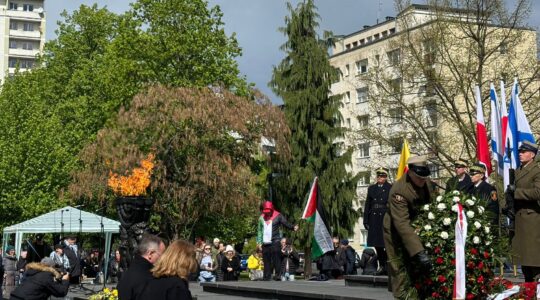MOSCOW (JTA) – Russian officials are welcoming President George Bush’s call for an international peace conference on the Middle East, seeing it in part as a way to bolster its own role in the region.
But Russia’s ties with Hamas put it at odds with most of the international community, raising questions about how influential it can be in any renewed efforts at Israeli-Palestinian peacemaking.
Starting with Foreign Minister Sergei Lavrov’s visit to Israel and the West Bank in late June, Russia has signaled that it sees the Israeli-Palestinian issue as central to its re-emergence as an influential player in world affairs.
In comments to journalists last week after Bush announced his latest initiative, Mikhail Kamynin, the spokesman for Russia’s Ministry of Foreign Affairs, referred to a similar proposal by Russian President Vladimir Putin two years ago in Cyprus.
“Our first impression is that the U.S. president’s initiative is along the lines of the search for collective ways to achieve peace between Israel and the Palestinians,” Kamynin said. “Russia, for its part, remains committed to the quest for a comprehensive settlement to the Arab-Israeli conflict, of which the Palestinian problem is the core.”
Yet Russia has diverged from the United States with its ties to Hamas. Bush’s appeal for renewed efforts on the Israeli-Palestinian front focused on bolstering Palestinian Authority President Mahmoud Abbas with financial and diplomatic support. He proposed a gathering in the fall to bring together representatives of the Palestinian West Bank with Arab envoys and their Israeli counterparts.
In boosting Abbas, Bush is seeking to further isolate the militant Islamic movement in the wake of its takeover of Gaza last month.
Russia, in contrast, has continued to cultivate ties with the Hamas leadership both in the Gaza Strip and Syria, with the hope that it could help reconcile the increasing strains among Palestinians.
Andrei Krivtsov, deputy director of the Information Department of Russia’s Foreign Ministry, told JTA that despite backing the Fatah-led government, Russia insists that any long-term settlement must take into account the interests of the entire Palestinian people.
“It is necessary to address the concerns of all Palestinians, including those who voted for Hamas,” he said. “We proceed on the assumption that Bush’s call is not an excuse to neglect the other half of Palestine and to conduct talks with just one group. Any attempt at a comprehensive settlement must be inclusive in its approach.”
Russia in recent years has tried to boost its role in the peace process beyond its membership in the so-called Quartet, which also includes the United States, the European Union and the United Nations. After curtailing its military aid to Arab countries following the Soviet breakup and normalizing its relations with Israel, Russia has sought to leverage its traditional contacts with the Islamic world by cultivating relations with Syria, Iran and Hamas.
Last spring, Moscow received a high-level Hamas delegation despite international pressure to isolate the group following its dominant showing in Palestinian parliamentary elections.
Russia has failed, however, to capitalize on its close links with Hamas and to make a convincing case to Israel and other members of the Quartet on the benefits of a continuing engagement with the group.
Following the eruption of hostilities in Gaza and Hamas’ takeover of the strip last month, Russia has continued to argue in favor of involving the group’s leadership to find the middle ground, even as this position has diverged from the international consensus.
In turn, Russian officials pressed Hamas to moderate its line and offer a broad acceptance of Israel, something the group has still forcefully declined to do.
During his June visit to the Middle East, Lavrov met with Israeli Prime Minister Ehud Olmert, Foreign Minister Tzipi Livni and then Deputy Premier Shimon Peres. Russia’s top diplomat bowed to Abbas’ entreaty that he cancel his planned meetings with representatives from Hamas.
At last week’s Quartet meeting in Lisbon, which backed Bush’s drive to reinvigorate the peace process, Lavrov insisted that a united Palestinian leadership is key to any progress in the talks. He expressed support for the “legitimate” Fatah-led government, but said boycotting Hamas would only complicate the region’s future.
A statement issued by the Russian Foreign Ministry noted that “the Russian side re-emphasized the necessity of restoring Palestinian unity and overcoming the schism” between Hamas and Fatah, which controls the West Bank, “for the purpose of advancing toward a real Palestinian-Israeli settlement.”
Some Russian experts have objected to the appointment of Tony Blair as the Quartet’s special envoy to the Middle East. After the Lisbon summit, Vladimir Anokhin, vice president of the Academy of Geopolitical Problems in Moscow, said the selection amounts to “the choice of just about the most inappropriate figure for the region.”
Anokhin said Blair would simply channel U.S. influence, and that Bush’s proposed conference is a last-ditch attempt to regain American standing in the Middle East and promote a further split among Arabs by excluding Hamas.
Some experts say that Russian attempts to act outside the Quartet format may only undermine the country’s efforts to advance its influence in the region.
Alexander Shumilin, director of the Moscow-based Center for the Analysis of Middle East Conflicts at the Institute of U.S.A. and Canada, said moderate Arab leaders and other key players in Israeli-Palestinian negotiations do not see Russia as a serious power broker or even an ally in the peacemaking effort.
The ties to Hamas have effectively deprived the country of neutrality, raising suspicions among the other players in the process, he said.
“Russia has continued to press its mistaken line by pursuing a relationship with Hamas and other terrorist groups,” Shumilin said. “If Russia is interested in strengthening its position in the region and making a difference in the negotiations, the only option is to renounce the past approach and act within the Quartet’s mandate.”





